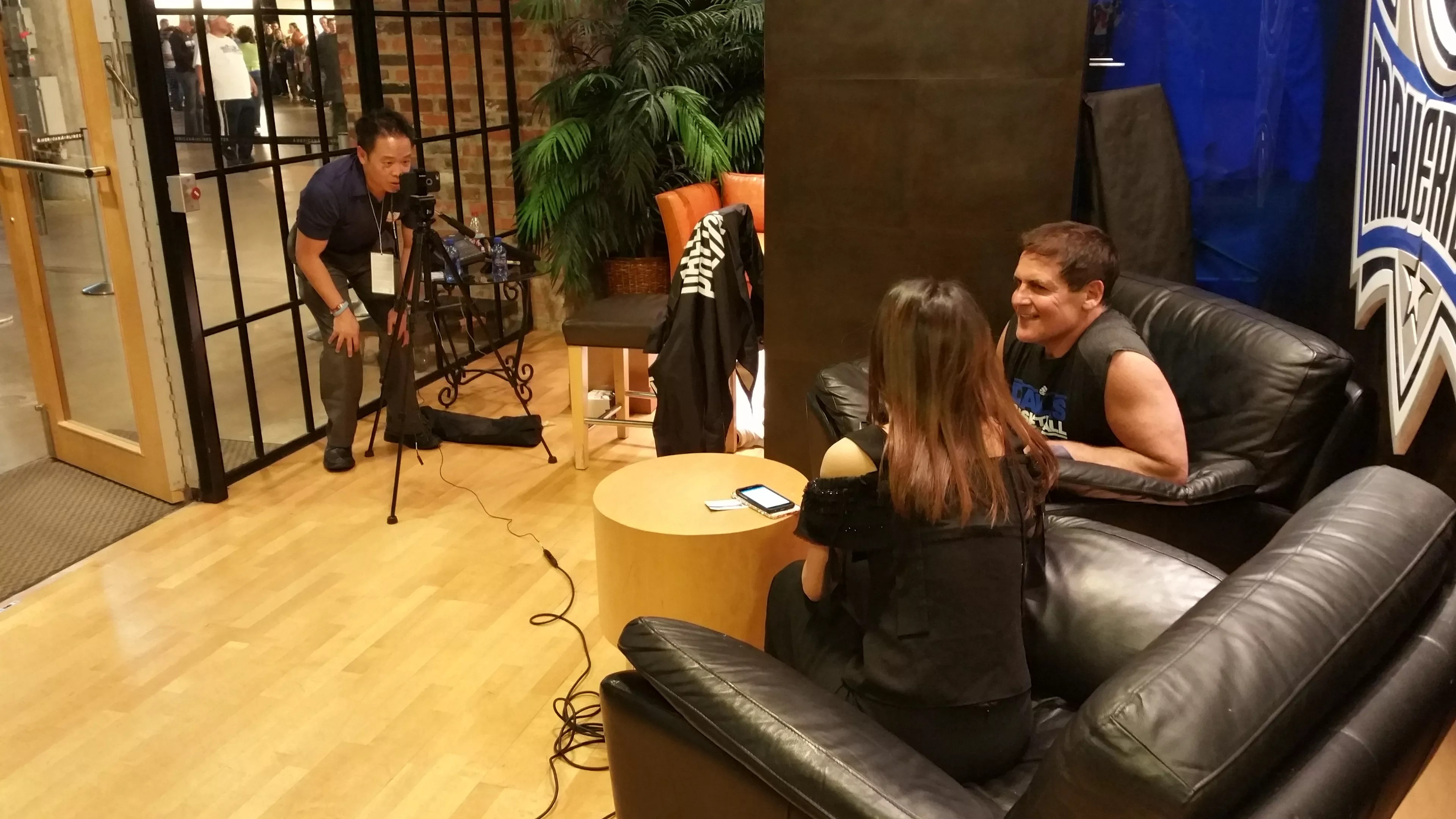
Joe Pappalardo

Audio By Carbonatix
“Sorry I’m sweaty,” Mark Cuban says, shaking hands with the ESPN China correspondents waiting for him outside the Mavericks locker room at American Airlines Center.
He’s wearing shorts and a sleeveless shirt, just minutes removed from the stair machine he habitually exercises on while taking pregame questions from basketball beat reporters. The two-person crew from ESPN China rates time alone with the Mavs owner. Coral Lu, international desk assignment editor, handles the interview as producer Howard Chen films.
The setup is lean: a phone camera to film, a tripod to mount it on and a handheld microphone. The pair spent the NBA season wandering the United States, gleaning information and meme-worthy tidbits from popular players and owners. Lu and Chen don’t set the schedule or the interviews; corporate powerhouse TenCent does that for them. They just have to keep pace, and traveling light is a must.
“Interviewing Cuban for a Chinese broadcast is huge,” Chen says before the interview.
ESPN China is not on any television station, but millions of fans access it online. ESPN and TenCent formed a partnership in 2016 to distribute sports content across the Chinese media giant’s many digital platforms. Variety called it “a major strategic deal” for ESPN, and with good reason. TenCent is worth an estimated $200 billion and owns some of the most-used social media sites in China.
Sports there are enormous nearly beyond the scope of American measures. More than a half a billion viewers watch NBA games streamed over social media in a season, making Chinese media companies hungry for the content. And then there is the money from merchandising. The NBA sells its stuff in 50,000 Chinese locations. “Nothing is more important than to grow the game of basketball here in China,” NBA commissioner Adam Silver told a crowd during a visit in late 2016.
It’s important to the Mavs too, and they are among the leading teams to actively court fans in China. There’s a history here that predates Cuban’s purchase of the team in 2000. The first Chinese player to get on an NBA court, Wang Zhizhi, played with the Mavericks in 1999. He became the first emissary between the Mavs and China, but far from the last.
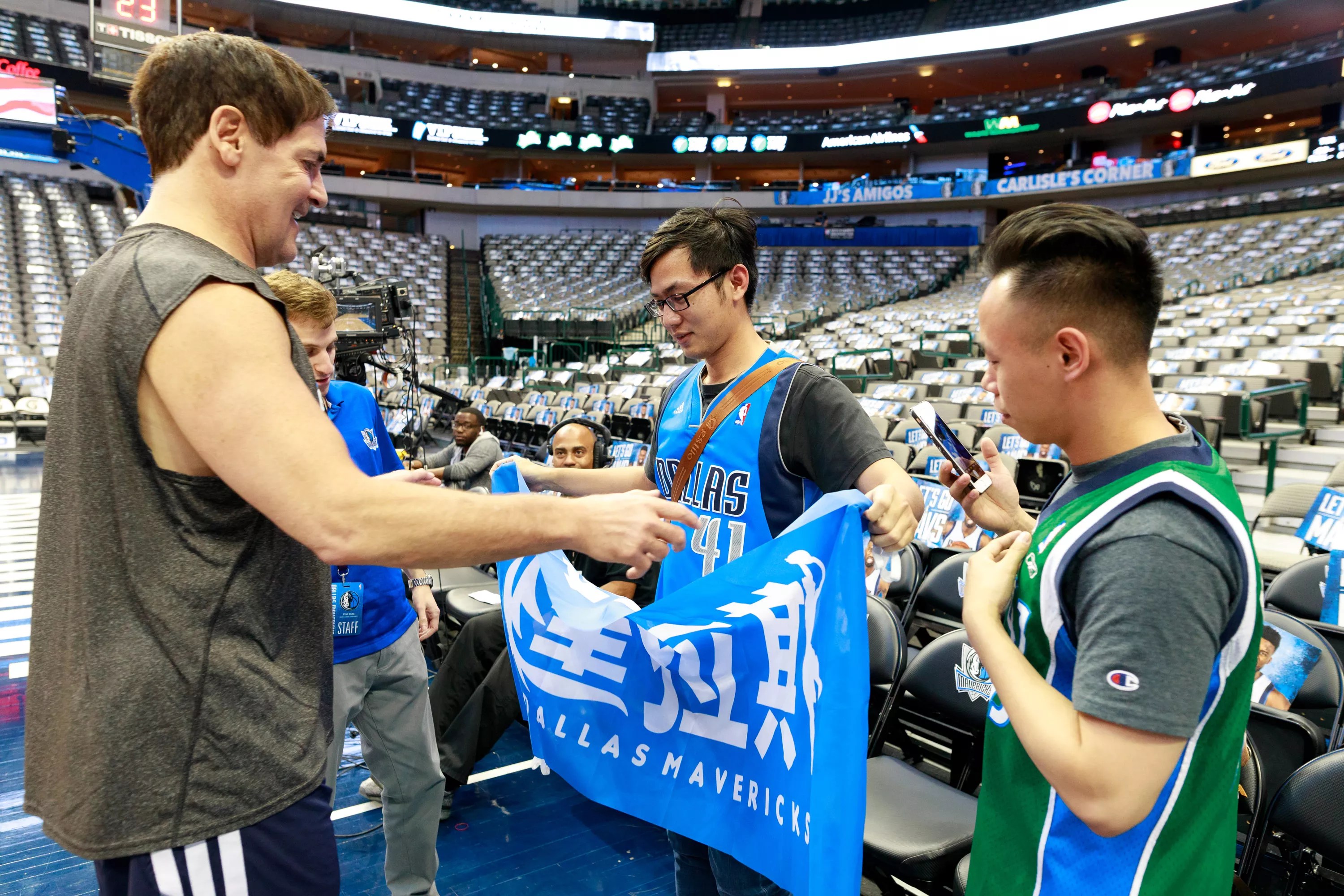
Mark Cuban (left) admires a banner brought by Taiwanese fans Sun Lizhe and Chen Shoupo.
Mikel Galicia
The Chinese mainland is still abuzz over having Dirk Nowitzki, a towering star in China, visit the nation in 2008. His fame crested with the Mavs’ championship win in 2011, cementing him in the pantheon of NBA stars in Asia.
Cuban is also a media celebrity as well as the team’s owner, and a small investment of time could reach a lot of people across the world. So he and Lu take seats in plush chairs outside the locker room to record a spot. He wears his familiar smirk/smile even before the interview starts, bare legs uncrossed and tipped with gray Nikes.
The ESPN crew has an idea to help the clip become viral: get Cuban to intone “Go Mavs” in Mandarin. It’s a phrase Wang Zhizhi taught him years ago, and it comes out smoothly when he faces the tripod and says it straight to the viewers.
Questions range from the number of games in a season, which Cuban is in favor of limiting, to the much ballyhooed trip of a Mavs superfan to Dallas earlier that season. Lu asks when Cuban will make his own pilgrimage to Asia. “I love China,” Cuban says. “I haven’t been there yet, but I’m dying to go.”
The ESPN crew dashes off as soon as the interview ends since the segment airs during halftime, and the game has already begun. The subtitled clip airs on time – and more than 2 million people watch it, live.
The team does more than make time to leverage the existing media in China to build their fan base. The Mavs themselves broadcast 75 games in China last season, as a few other teams do. The Mavericks are the first NBA team to produce content specifically for their Chinese social media channels.
Part of the strategy is to produce material that is tailored to the market, and that means more than running subtitles on games. “The interactions need to be authentic,” Cuban tells the Dallas Observer after the ESPN interview ends. “These are great NBA fans. Many are Mavs fans.”
The team appears to be doing something right. Many of their Miaopai (a Chinese video-sharing platform) offerings have enviable receptions. One recent video, featuring players eating traditional Chinese New Year’s treats, reached over 1 million views in a day. Using Weibo and other Chinese social media platforms, the Mavs say they have 800,000 Chinese followers.
With such lofty ambitions and high stakes you’d figure that the team would have a team of ace media specialists working to make this vital outreach happen. Instead, the Mavs have 24-year-old Ryan Kline.
In 2015, a junior account planner at the Slingshot ad agency in Dallas received a message from a family friend via Facebook, telling him the Mavs had a job opening. Ryan Kline could hardly believe it. If it worked out, he would be working for Mark Cuban.
For Kline, just five months into his first job out of college, the message came out of nowhere. He’d never met Cuban and didn’t even follow basketball. “I never thought I’d end up in sports,” he says. “I played soccer in high school and tried club wrestling for two years in college, but was never much of an athlete.”
In seventh grade Kline made the fateful choice to study Mandarin Chinese. “I didn’t have a particular interest in China,” he says, but preferred it to Spanish, French and certainly Latin.
A school-organized summer trip to China in 2009 opened his eyes to the difference between book-learning and actual interaction. “My first trip definitely reinforced my passion for the language,” he says. “Not so much being in China itself, although that was fascinating. But the ability to converse with people, that was the biggest draw.”
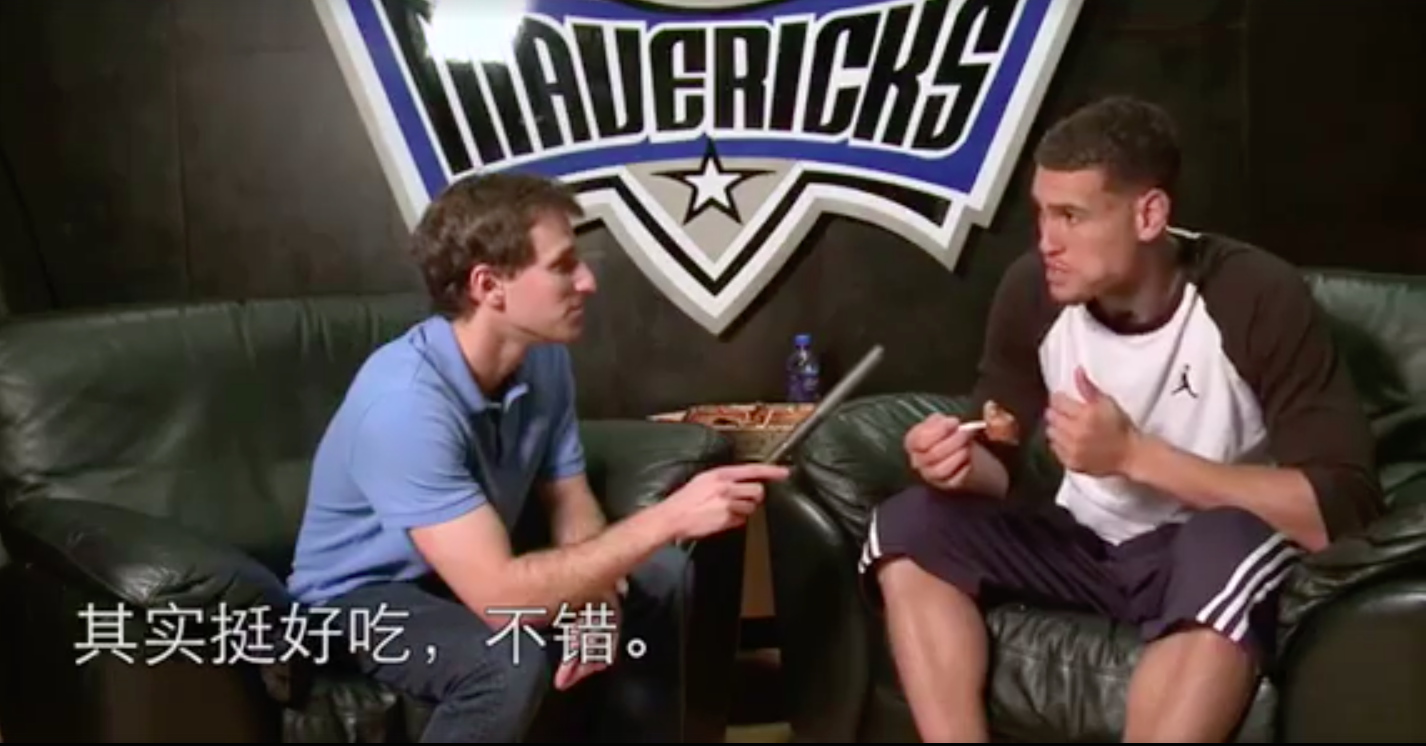
Ryan Kline feeds traditional Chinese food to players in a video viewed by a million people in a single day.
Dallas Mavericks
He also adopted video production as a high school passion, doing hands-on work creating short films in the school’s program under the tutelage of teacher Corbin Doyle. Kline also became active in the Dallas film festival scene, producing a trailer for Dallas Video Fest. He counts festival director Bart Weiss as another mentor.
Kline attended Yale and didn’t pursue much video work, graduating with a 3.86 GPA. When Cuban heard of the Ivy league educated, Mandarin-speaking 20-something, he hired him away from the ad agency. The Mavs were not looking for a PR specialist to be on the front lines, at least when the outreach plan started. “We needed a video whiz, and he happened to speak Chinese,” Cuban says. But Kline quickly generated content ideas that could reach millions of people.
Cuban believes in preserving the startup ethos of “keep the organization flat.” He explained why on his website in 2008. “If you have managers reporting to managers in a startup, you will fail,” he wrote. “Once you get beyond startup, if you have managers reporting to managers, you will create politics.”
“He gets it done and he doesn’t fuck around.” Mark Cuban on employee Ryan Kline
There are fewer employees in the Mavs organization but each has a broader reach. That translates to more opportunities for Kline, who reports directly to Cuban. Not that the position equates to much face time; most of their communication is through email.
Early in his tenure, Kline sent Cuban an email suggesting a Chinese language video wishing the nation a Happy New Year. Cuban responded with the idea to create a weekly roundup during the season for the Chinese audience, something that merges Kline’s media and language skills and proves to Chinese fans that they belong to a wider family.
Cuban now seems to rely on his young China hand. Not too many questions into a discussion about China with the Dallas Observer, Cuban swivels his head to a media relations staffer and asks, “Has he spoken to Ryan?”
Soon after, he calls Kline “a rock star.”
“If you want to be a success in this organization, if you reduce other people’s stress and reduce my stress, you’ll be all right,” Cuban says. “He gets it done, and he doesn’t fuck around.”
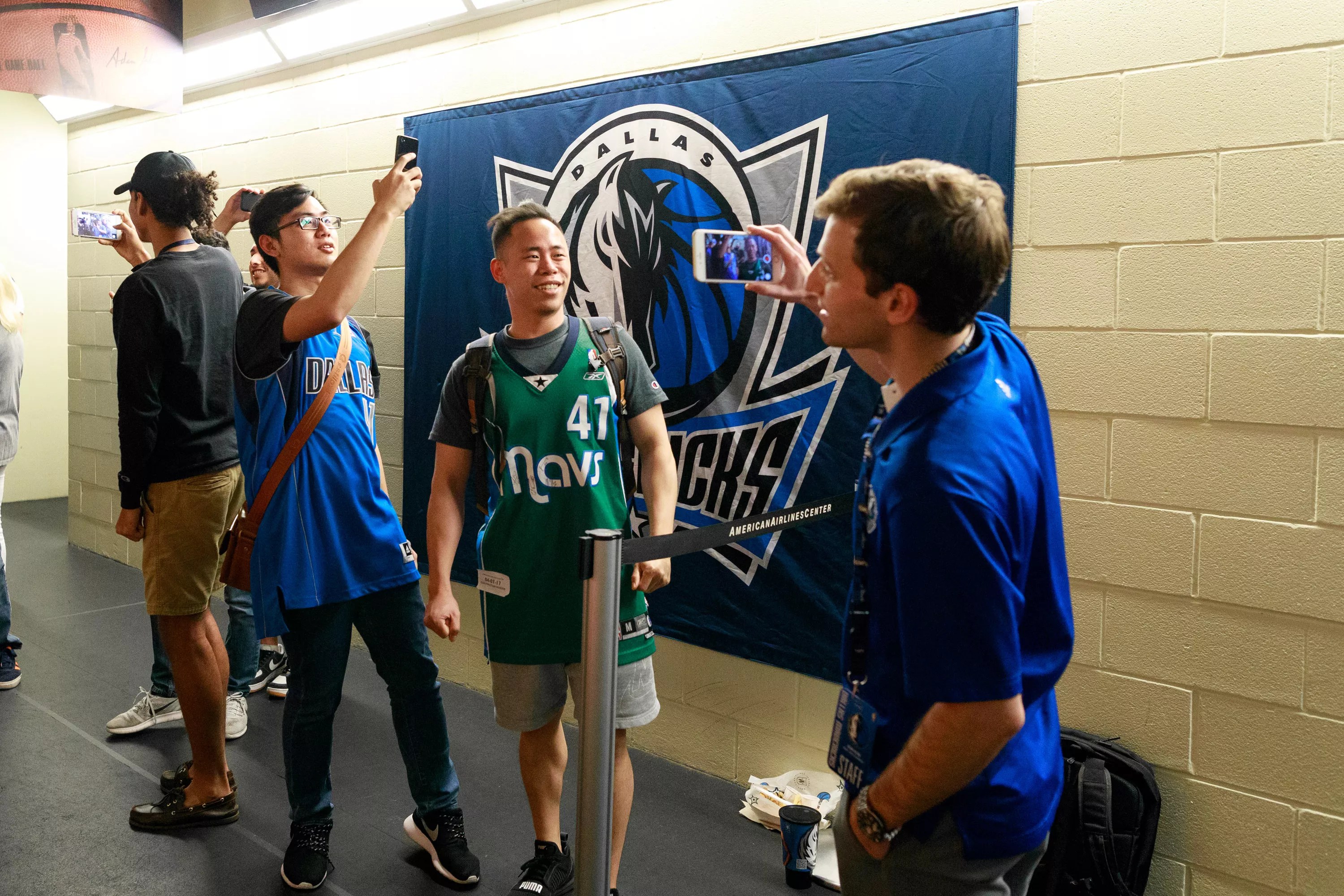
Phones are crucial means of communicating with Chinese audiences.
Mikel Galicia
Before Kline came on board, a fan in Dallas voluntarily ran the team’s Chinese social media, particularly their Weibo account. Weibo is sort of a bastard offspring of Facebook and Twitter, a microblogging site owned by Chinese media giant Sana.
Kline is the first to admit he was not starting from scratch. Basketball has been a big deal in China since the 1990s, and the league has been eager to continue to expand there, even opening offices in Beijing, Hong Kong and Taipei. And social media is the key vehicle to get the sport in front of fans. “The NBA has been at this for 20-plus years,” Kline says. “They’ve enabled this to happen. They even set up our Weibo account.”
Kline gradually took the reins of the team’s Chinese social media, making sure to pay attention to more than just the stats. He can say that his job demands he “stay on top of GIF culture” with a straight face.
One of Kline’s primary jobs is to create content for Chinese social media consumption. Doing this requires several layers of translation. The first is literal, in that he needs to understand and write in another language. He also had to learn a slate of basketball terms in Chinese, from the positions to the fouls. And there’s no dictionary for street sports lingo, as he found.
“One of Dirk’s nicknames is Taxi Driver,” he says. “For a while, I couldn’t figure out what people were talking about.” It turns out that the pronunciation of his last name mirrors the Mandarin word for taxi driver, leading to various derivatives on social media. Of course, the Chinese characters are different – only the pronunciations echo – making Kline’s deciphering even harder.
That’s just the language barrier; Kline also faces an ever-changing, dynamic landscape. “Taiwan and Hong Kong track pretty well [to U.S. social media], since Facebook and Twitter are just as popular,” he says. “But mainland China is a different animal.”
Indeed. The Chinese government operates the largest, more onerous internet censorship regime in the world. The group Freedom House named the government “the worst abuser of internet freedom” in 2016, beating Syria and Iran. Beijing bans Twitter and Facebook and the nation has their own indigenous versions. But that’s just the start. There’s a dynamic social media landscape that is ever-shifting and ever-growing, and Kline needs to navigate there to get eyeballs focused on the Mavs.
“The sports media landscape in China is as developed and as competitive as it is in the United States.” – ‘Charlie Smith’
It would be easy to envision a media environment that was weighed down by censors and exclusionary, but the reality is more complex, especially when it comes to sports. “This is an area where private Chinese internet companies have really grown,” says Charlie Smith, a pseudonym used by of a co-founder of GreatFire.org, responding to Observer questions via email. The group has been working to end online censorship in China since 2011. “The sports media landscape in China is as developed and as competitive as it is in the United States. I think overall, the authorities are happy for Chinese to be spending their time – some would say wasting their time – following and talking about sports instead of say, following and talking about ‘sensitive’ issues at home.”
For Kline, this permissive environment means constant vigilance for newly hatched apps, sharing platforms, influential Chinese bloggers and superfan websites. “There are hundreds of thousands of live stream stars,” Kline says. “It’s taken on this life of its own and in this way the U.S. is lagging behind.”
One platform has eluded the team: WeChat. This is the dominant digital platform in China right now. “It’s the first thing you download onto your phone,” Kline says. “It’s the way you get email. It’s replaced hailing cabs.” The problem is that the Mavericks don’t have a WeChat account. Kline cites problems with government regulations and declines to elaborate, but also says that next season their content will have a home on WeChat.
Kline maintains that covering sports makes it easy to avoid hot-button issues that bring government intervention. “That’s the great thing working on this; you don’t have to worry about it,” Kline says. “You know what issues are sensitive and you avoid them.”
A 2017 report by the University of Toronto’s School of Global Affairs describes in detail the way the government censors WeChat. “Internet companies in China are required to follow laws and regulations on content monitoring,” it reads. “Failure to control and filter unwanted content can lead to fines or revocation of operating licenses.” Messages sent over WeChat pass through a server that contains a filter for keywords. A banned keyword results in the entire message being blocked. Free speech activists heap scorn on U.S.-based companies like Microsoft for creating the tools that make this happen, or for Apple for removing offending apps from stores to placate the Chinese government.
Charlie Smith says the team has likely been briefed by government officials and given rules of the road.
“The team was probably told explicitly to monitor content that goes out on Mavs social media in China and probably also the team’s social media profiles outside of China,” he says. “Players may have been told to tone down any message that may offend the Chinese. However, these are just small things compared to the harmful initiatives of companies like Microsoft, Apple and Yahoo.”
The open dialog may actually help chip away at censorship. “To be honest, at the end of the day the players are going to be themselves,” Smith says. “Somebody is going to say something one day that will slip through the net.”
Mark Cuban is not subtle when he instructs the Mavs’ back office to fixate on fans, whether they are at home or abroad. Banners hang from the walls of their spartan Deep Ellum headquarters reminding them in various ways that the fans come first.
This applies to Chinese fans, as well. For the Mavs, they are not only customers but part of the storyline. “Some teams just run subtitles and focus on the game,” says Lu, the ESPN China correspondent, “and not the fan reactions, like the Mavs do.”
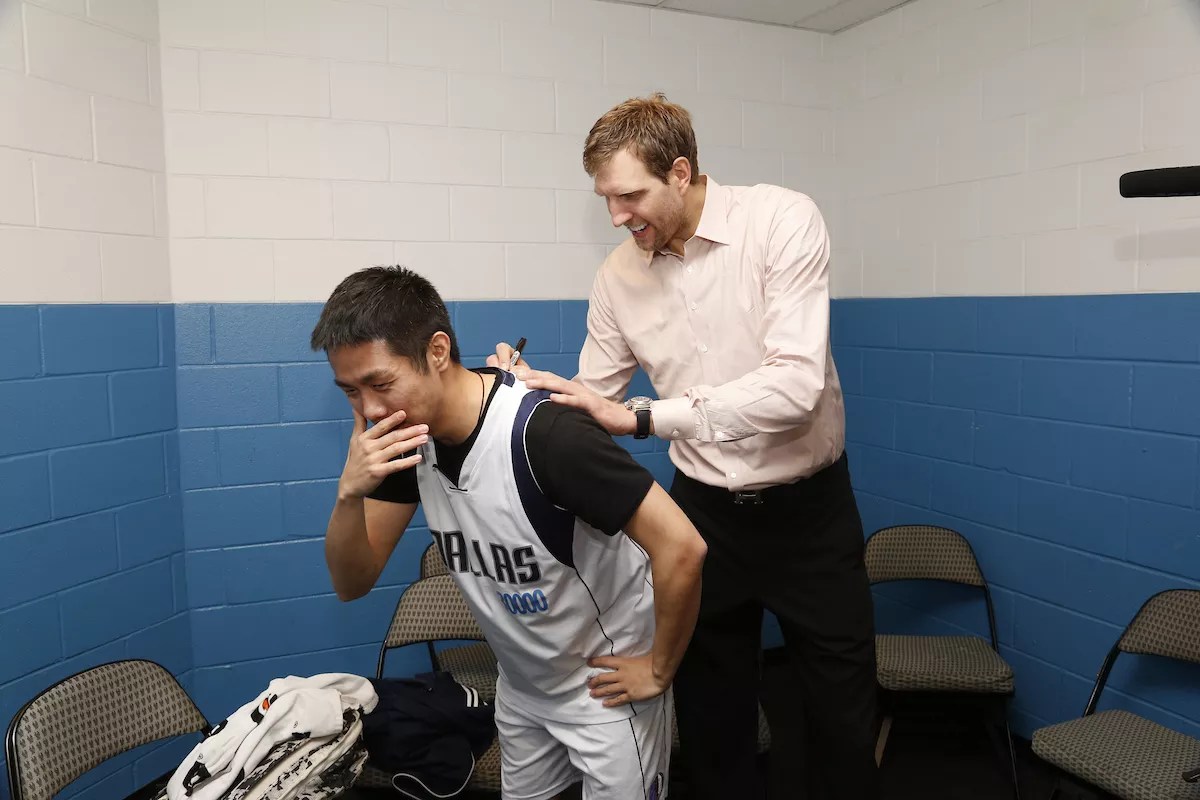
Shen Xu gets emotional as Dirk Nowitzki signs his shirt during a visit to Dallas.
Danny Bollinger, for the Mavs
Kline often wanders the arena during games, ears attuned for Chinese speakers, so he can greet them and find out where they get their Mavs news from and what they might want in the future. “I started asking, can I make a video of you really quick?” he says. This elevates fans to the level of content and not just the consumers of it.
One recent opportunity was too good for Kline to pass up: the trip of Shen Xu, a 27-year-old entrepreneur from Beijing. He is also a rabid Mavs fan, and absolutely worships Dirk Nowitzki. The superfan attracted Chinese social media attention with a stunt to honor Nowitzki’s scoring 30,000 points. It took the player an entire career to rack them up; Xu planned to shoot 300 points a day for 100 straight days at a local court.
“Our generation of Chinese youth is always portrayed by the media as having energy and emotion, but lacking responsibility and persistence,” Xu said at the time. “So maybe my doing this project, even something this small, can help break that stereotype.”
To Kline, this was a fan who deserved a response from the team. “I just liked him right away, and I knew he would resonate,” he says.
Xu had plans to travel to Dallas in March 2017 for his 100th day of shooting on the Mavs home court. The team rolled out the red carpet and Xu played the superfan perfectly, gushing enthusiasm and nearly weeping at the access to the facilities, Cuban and the players. He became overcome with emotion when he met Nowitzki. Local Mavs fans high-fived him as he got a Dirk Burger from the concession stands.
“Seeing Shen Xu’s excitement around every detail of the trip, from stepping on the practice court to walking the concourse of the AAC, was a reminder of how strong an influence the Mavericks, and sports generally, can have on hundreds of millions of people,” Kline says. “We have a rare opportunity to have a positive, global impact that brings people together.”
The story of Xu echoed throughout Chinese media and also made headlines locally. In a season in which the Mavericks finished last, such a media event is even more vital. “China likes teams that win,” Howard Chen notes.
Kline agrees, and says the social media metrics correlate with the standings in the league. But using fan enthusiasm to fill the vacuum left by a losing season is something the Mavericks do well at home, as well. Despite their first losing season in 16 years, the team boasts the second best attendance.
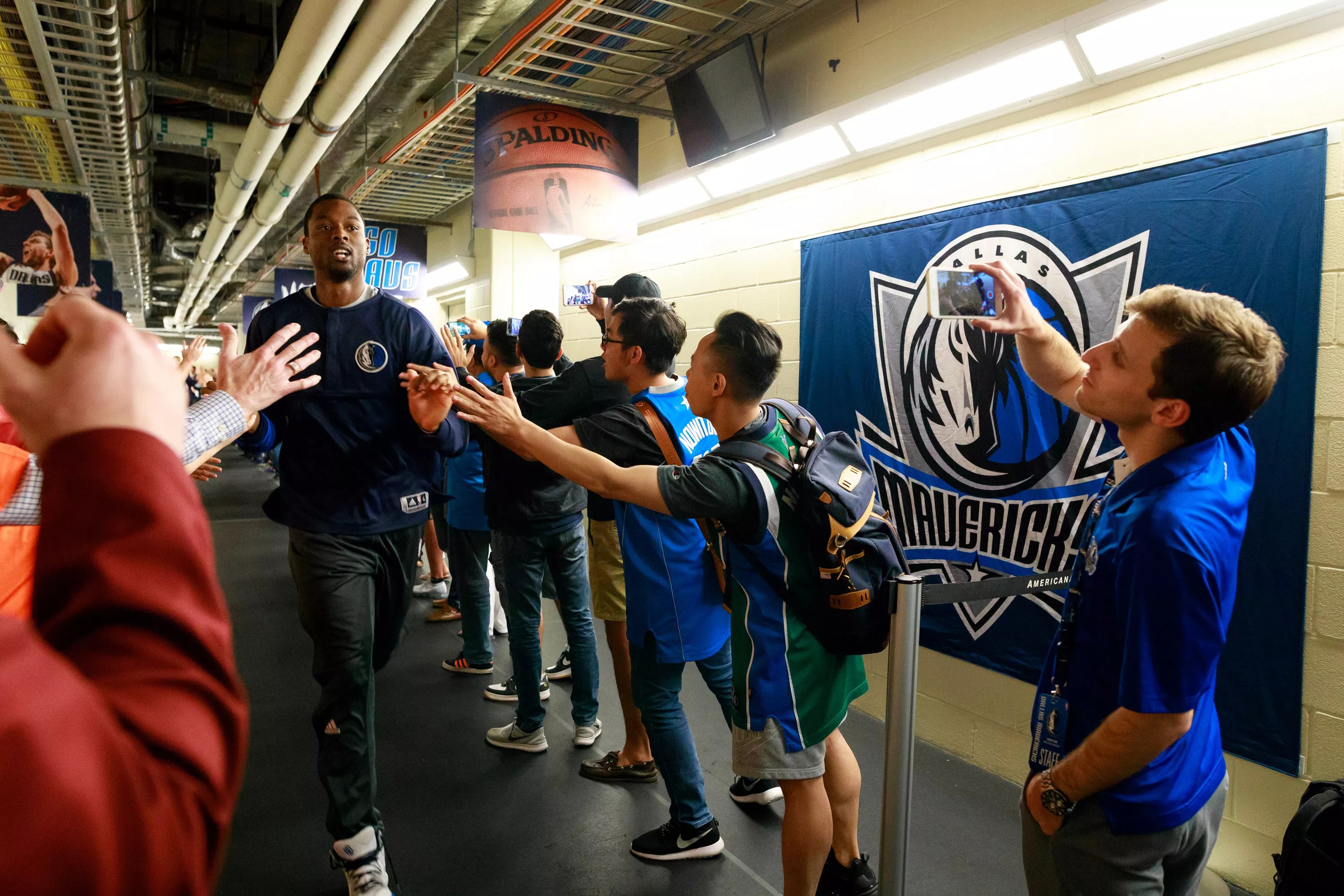
Kline shoots video of the players entering the stadium as his Taiwanese guests high-five them.
Mikel Galicia
Sun Lizhe and Chen Shoupo sit court side and watch the Mavs warm up for the second to last game of the season. The team’s record is dismal and playoff hopes are long since dashed, but the Taiwanese duo are focused on the positive. This is their first trip to the United States. They went to San Antonio and enjoyed it, but the centerpiece of the trip is a Mavericks home game.
They paid for a package deal to tour the arena, meet Cuban, greet the team as they ran onto the court and watch the game. “This season Mark was trying to launch new ways to interact with fans in Greater China,” Kline says, smoothly lumping mainland China, Taiwan and Hong Kong into one diplomatically acceptable phrase. “That included travel services, custom packages for fans.”
The idea sprang from Kline’s realization that fans were making this pilgrimage from Asia on their own. Realizing how often this happens, it became a package that helps fans get an experience worth the trip.
MavsTours packages this season range between $1,200 and $4,000, depending on the number of games attended, quality of the seats, price of the hotel and add-on tourist activities. The company says that “all packages included airport transportation, hotel accommodations, a tour of the Mavericks new practice facility, a behind-the-scenes tour of the American Airlines Center, a chance to watch player warm-ups court side before a game, participation in the Whataburger High Five Line and a tour of the Mavericks’ locker room.
“All travel packages also include international travel health insurance and 24/7 guide and translation services.”
That guide is Kline. Lizhe and Shoupo to eat at Ellen’s Southern Kitchen on North Record Street before doing the full facility tour before the game. They are particularly impressed with being on the patio where Nowitzki sang “We are the Champions” to crowds after the 2011 championship.
“He’s the reason we have such a huge fan base,” Kline says. “In China, people gravitate to players more than teams.”
Sun Lizhe says they are the envy of their fellow fans in Taiwan. “It is a dream for a lot of Taiwanese fans to come here for a game,” he says, with Kline translating. “Our friends are very jealous.”
Cuban dashes onto the court before the game and beelines to where Ryan is standing with the two Taiwanese men. The owner is all smiles as the pair unfurl a sign and pose for photos. Lizhe, a shy man seemingly starstruck, quietly utters something. Cuban blinks, confused, then realizes he’s saying “Go Mavs” in Mandarin, and repeats it back with much glad-handing. Then he disappears back into the offices, dubbed “the bunker” by staff.
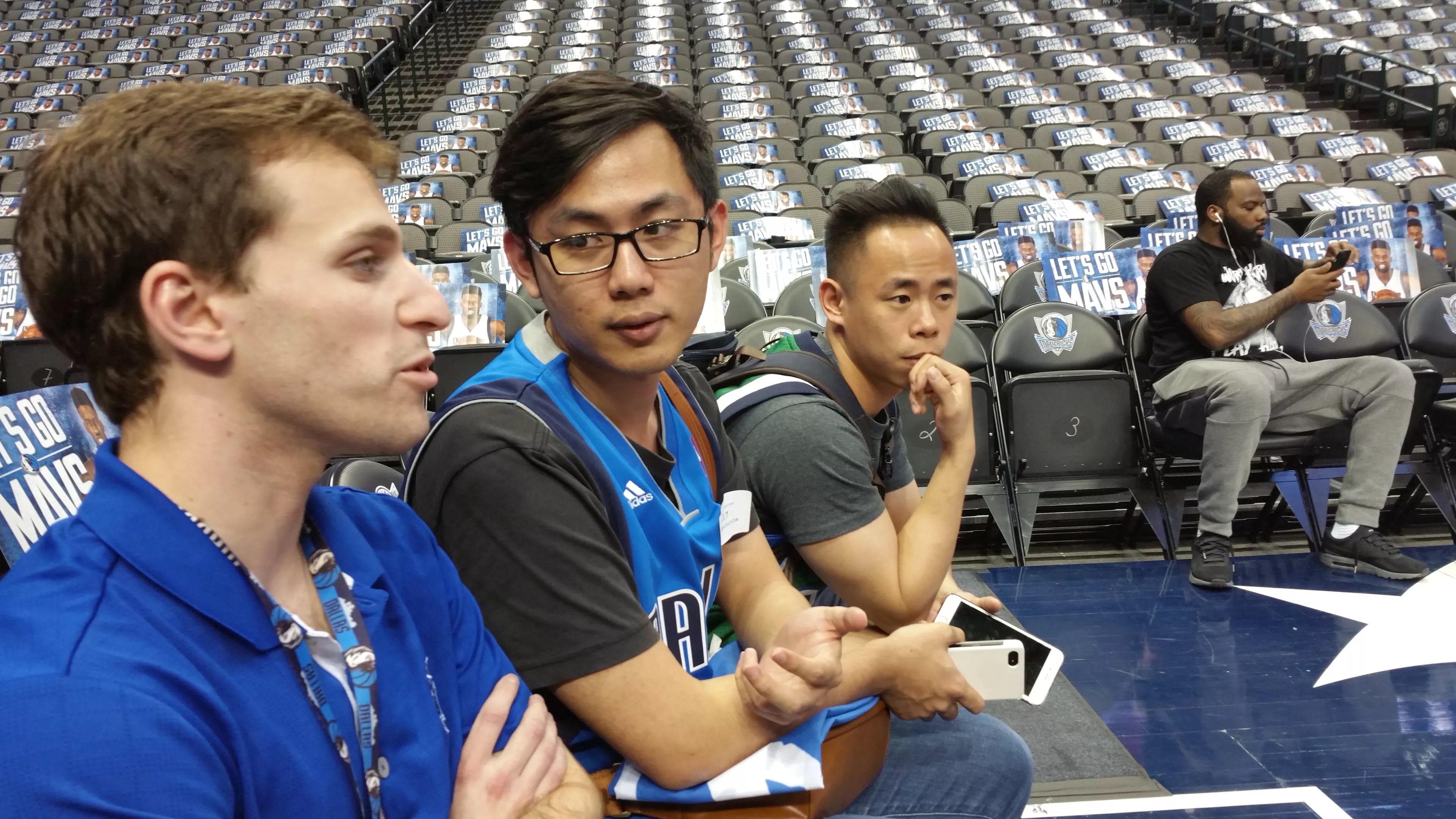
Sun Lizhe (center) and Chen Shoupo (right) sit court side with Kline during warmups.
Joe Pappalardo
Later, Cuban says other international markets could get equivalent attention, including India and Africa. “The end game is to keep the NBA growing around the world,” he says. “We’re really trying to make basketball the most global game.”
Kline already has his hands full with China. Later this year he’ll have a new season to cover, a new slate of fans taking pilgrimages to Dallas and new social media channels to populate with team content. And he may have another unexpected consequence of his job: being a back office celebrity. Ever since he appeared in the Chinese New Year’s video, his stock in China has risen. “I’ve had a few people recognize me at the arena or message me online to ask if they can meet me when they attend a game,” he says. “It’s been a wild ride already, and I’m only 24.”
When it gets close to game time, Kline delivers his two Taiwanese wards to the line of fans who watch the team run onto the court. Since they are happily distracted, he can check his phone and catch up on the numerous Chinese feeds. Walking head down, gaze fixed on the glowing screen in his hand, he strolls through the corridor between jittery fans waiting for the Mavericks to emerge. No extends a hand to slap or even looks at him, but it’s clear from more than his team-branded shirt that he belongs. Not every player on the Mavs team makes his mark on the court.